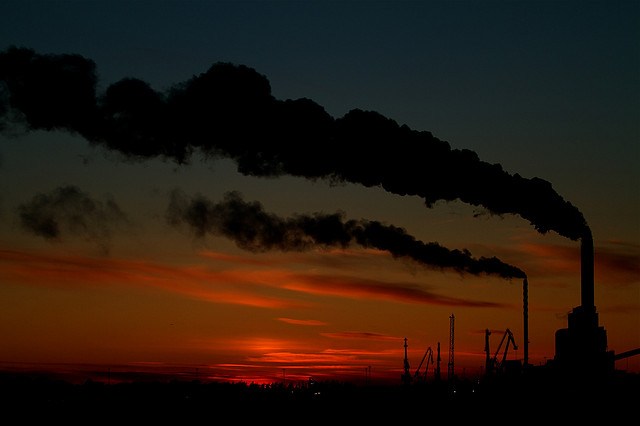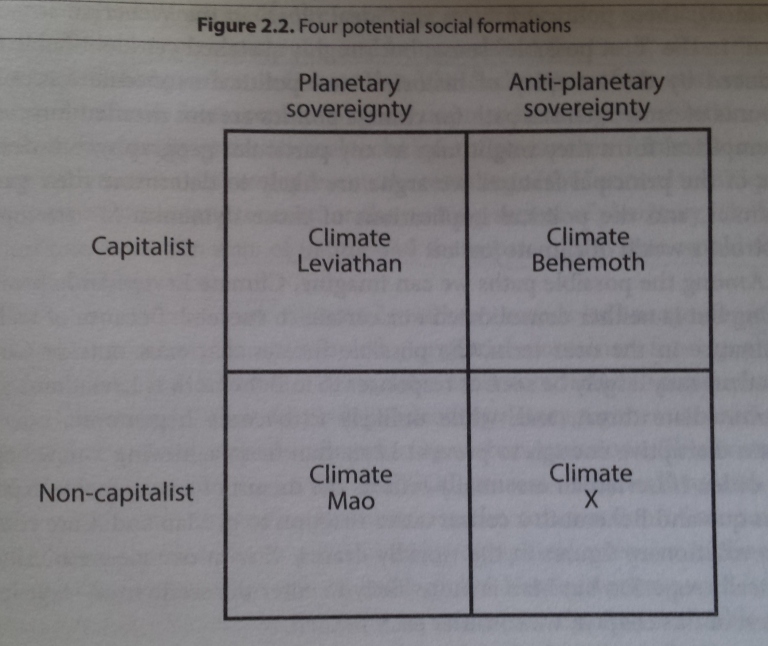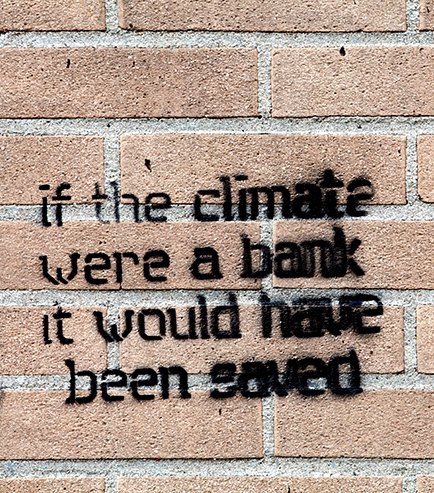Gabriel Levy reviews Climate Leviathan: a political theory of our planetary future, by Geoff Mann and Joel Wainwright (London: Verso, 2018).
What are the real political prospects, as the world hurtles towards global warming? Not our hopes or desires, but really possible changes – good, bad and horrible – starting from where we are now?
Geoff Mann and Joel Wainwright, researchers of political theory who have been actively engaged in the “climate justice” movement for many years, address these questions in this thought-provoking book.
 |
| Photo: Mikael Miettinen, creative commons |
There are two fundamental ways to divide the options, they argue (pp. 28-29). First, whether the future economic order will be capitalist or not. Second, “whether a coherent planetary sovereign will emerge, that is, whether sovereignty will be reconstituted for the purposes of planetary management.”
By “planetary sovereign” they mean some form of world government, or at least coordination of governments on a world scale. These two choices produce four options, Mann and Wainwright argue, which they name:
- “Climate Leviathan” – planetary sovereignty, in a capitalist economic order;
- “Climate Behemoth” – a reactionary state of capitalism without any planetary sovereignty;
- “Climate Mao” – dominance by an “anti-capitalist, state-centred” politics; or
- “Climate X” – movement along an “anti-capitalist, anti-sovereign” path.
These four alternatives are set out in a diagram in the book, reproduced below.
If, like me, you find much “political science” superficial, and “scenario analysis” guilty of asking the wrong questions, don’t stop reading!! Mann and Wainwright ask many of the right questions, in anything but a superficial manner. (If anything, I would have preferred a book with fewer long digressions on political theory.)
The scenarios in Climate Leviathan push us to think not only about what we want to happen – yes, I want “Climate X”, as the authors do – but about what might actually happen. Good idea – since, if we don’t think about what might actually happen, we will never achieve what we want anyway.
Mann and Wainwright write (p. 166) that the facts of global warming are “extremely depressing”, and continue:
It is often said that, in organising, an emphasis on the negative rarely works – we need a positive vision of change – but we can not lie to each other or to ourselves. How then can we build resistance and confront our political challenges without lapsing into half-truths or redemptive assurances that it will all work out in the end? Only by bringing many more people into a critical analysis of our challenge, our conjuncture.“Thoughtful speculation” on the future is vital. It is:
[A]nalytically and politically superior to all the other options currently available: pretending everything is “normal”, embracing the false hopes peddled by techno-utopians, abandoning ourselves to nihilism (“we’re fucked”), or, worse still, validating the visions of the apocalyptic books and films that transmute our fears into spectacular, dystopian commodities (p. 130).Mann and Wainwright work through their four options, arguing that “Climate Leviathan” is the most likely medium-term outcome, and that a challenge along “Climate Mao” lines may emerge, in Asia for example.
They advocate a “Climate X” approach that tackles climate change, together with striving for social justice, on the basis of three political principles: equality; “the inclusion and dignity of all” as the means to genuine democracy; and “solidarity in composing a world of many worlds” (pp. 175-176).
Critique of “climate justice”
Mann and Wainwright look at future politics through the prism of climate change politics now – that is, the international climate talks that began at Rio in 1992, and, in particular, the Paris agreement of 2015 – and a critique of the “climate justice” movement, in which they have both participated.
International summits such as Paris had presented the movement with questions about whether and how to demonstrate, they write:
Demonstrations against the Iraq war targeted state institutions; Occupy Wall Street seized public space. In contrast, most in the climate justice movement did not want to close the United Nations or COP21 [i.e. the 21st Conference of the Parties to the 1992 Rio summit, in Paris in December 2015] meetings. On the contrary, they wanted to compel them to go further. In that situation, the left protester becomes, if reluctantly or ironically, a cheerleader for elite institutions: less “Shut it Down!” than “Make a Deal!” How should one protest against an international forum one wishes was different and more effective, that one would in fact be for if it were powerful and radical? This has proven a complicated strategic question for the climate justice movement. This partly explains why we generate more popular traction, and greater solidarity, when targeting concrete things for opposition, like coal mines, pipelines, or (at least in a vague way) Wall Street (pp. 163-164).In reality, Mann and Wainwright argue, there is a “lack of coherent political positions on absolutely key questions” among climate justice campaigners. For one thing, there is a tension between the national or local character of movements focused on particular countries or particular regions, and the global character of climate change.
The movement’s response tends to be to celebrate its diversity and plurality, but that can “obscure important and persistent problems”, Mann and Wainwright argue:
Rather than own up to the enormity of the political and ecological challenges of the future – which are colossal, and the Paris Agreement hardly puts a dent in them – we are tempted to rationalise our marginality as an inevitable product of the world in which we are forced to live (p. 166).
In place of critical reflection, “we find ourselves telling each other how awesome our movement is”. We tell ourselves we will eventually succeed, while “cheering our way to catastrophe”. It would be better, Mann and Wainwright argue, to clarify and face the political issues on which the movement is divided. They then challenge, thoughtfully and at length – and in a dialogue with Naomi Klein’s book This Changes Everything – the politics of “regulated, green capitalism” that are strong in the climate justice movement.
[T]he suggestion that the problem is or was neoliberalism, not capitalism, which is what so many of us want to believe even if we know it is not true, is potentially fatal, because it consistently leads much of the climate justice movement away from a confrontation with capital, at both the level of political anaslysis and political practice (p. 170).
When people say “system change not climate change”, there is a “tacit assumption that ‘system change’ means a green, renewables-based capitalism”. A strategy has to be developed that confronts capital, and confronts the nation states that manage it. No easy task.
“Climate Leviathan”?
Mann and Wainwright argue that the Paris agreement, and the dynamics of an international political set-up dominated by the US and China, are moving towards “Climate Leviathan” – some form of planetary sovereignty over a capitalist economy. The Paris agreement failed to set binding limits on carbon emissions or address the need to keep fossil fuels in the ground, but, nevertheless, “constitutes an important step towards the emergence of planetary sovereignty” (p. 38).
This sovereignty will marshall adaptation to a warming world, on the northern elites’ terms, Mann and Wainwright believe. There could be “a shift towards a world-scale authority”; “the logic of the interstate system points towards its creation” (p. 151). The development of weaponry, its potential for geoengineering, and capitalism’s inherent tendency towards crisis, all push in this direction, they argue.
(Note. In climate politics jargon, adaptation refers to measures dealing with the consequences of global warming, e.g. sea level rise, ruination of tropical-zone farmland, etc, as distinct from mitigation, i.e. measures to slow down global warming, e.g. reducing fossil fuel use.)
 |
| From Climate Leviathan |
This impetus towards world government is far weaker than Mann and Wainwright believe, in my view. As global warming advances, the stronger capitalist states are more likely to deal with the consequences by turning on each other, by pulling away from globalisation, and by trying to separate their own populations from those suffering in the global south.
The movement in this direction is clearly visible, and it dates back beyond the election of a trade-warrior climate-science-denying madman as US president. Long before Trump, the international political system based on US hegemony was in decline; Trump is actually a result of that decline, as much as a cause. The surge of economic hardship caused by the 2008-09 financial crisis, the bloodbath in Syria, the difficulty that US and European political leaders have with a newly-aggressive Russia, and political instability in Europe were all signs of this.
I see no indication in the Paris agreement that political leaders diverted their attention from these problems; that they are any closer to taking serious joint action on adaptation to climate change, let alone mitigation. On the contrary, hard on the heels of the agreement we saw, in the European reaction to the increased flow of refugees, indications of the sort of responses we can expect to the hardships created by global warming. The refugees were targeted by rising right-wing populism, allowed to drown en masse in the Mediterranean, or used as a cynical bargaining chip in European relations with the authoritarian Turkish government.
The greater flow of refugees was caused mainly by war and poverty, rather than climate change. But the reaction tells us what we can expect. To me this looks closer to what Mann and Wainwright call “Climate Behemoth” – reactionary capitalism without planetary sovereignty – than “Climate Leviathan” or any type of world government.
The Paris agreement itself also places a question mark over “Climate Leviathan”, to my mind. First, because it was not, as Mann and Wainwright suggest, “the first global agreement on climate change” (p. 36). Paris was the outcome of a long process, starting with the Rio summit in 1992 and the UN Framework Convention on Climate Change adopted there, of global agreements that failed to deliver what they themselves recognised to be necessary.
After Rio came the Kyoto protocol of 1997, which actually required signatories to reduce carbon emissions by certain amounts – but it was contrived, with the use of trading permits-to-pollute and other mechanisms, in such a way that it failed to reduce global emissions at all. Hopes that new, stronger targets would be set were dashed at Copenhagen in 2009; Paris, with its voluntary targets, was an admission by the leading nations that no concerted international action was possible.
Second. Mann and Wainwright are 100% aware of the weakness of the Paris agreement with regard to greenhouse gas emissions mitigation, and I am sure we agree on that. Their argument, if I have understood it, is that Paris is a “legal and political foreshadowing of Climate Leviathan’s form” (p. 35) because it will orchestrate adaptation strategies as “a key means by which to salvage US hegemony – a prospect that only increases the likelihood of consolidation” (p. 34). These strategies will reinforce inequalities, they argue, and will centre on geoengineering measures.
While I think the threat of geoengineering is serious – and, certainly, it features increasingly in the work of the Intergovernmental Panel on Climate Change, to the consternation of many scientists – I think it is as likely to be unleashed by a few powerful governments, without international agreement (remember the Iraq war?), as it is to be used by decision of the UN or similar body.
Third, history tells us that – because of the inherent contradictions between capitalist nation states – governance crises have not previously been solved by world government. I don’t see why they would be in future. Hasn’t the UN always in practice been subordinate to the most powerful states? And hasn’t that always been its weakness in the face of truly global problems?
Mann and Wainwright recall that the “nuclear one-worldism” touted on the political left in the 1940s – the idea that the nuclear threat was so terrible that the world’s great powers would unite to manage it – was “defeated by history” (p. 141). Then they discuss how the idea of world government evolved. Maybe the history of the UN itself, rather than of the idea, tells a different story.
Mitigation, and technologies
A central theme in Mann and Wainwright’s argument is that mitigation of climate change effects has failed, and the issue now is adaptation. “The possibility of rapid, global carbon mitigation as a climate change abatement strategy has passed. The world’s elites, at least, appear to have abandoned it – if they ever took it seriously” (p. 28). This assumption is mistaken, and closes the door to some important speculations about how things might go from here.
Firstly, it is not quite right that the capitalists internationally have abandoned mitigation as a strategy. Mitigation is central to the measures proposed by the International Energy Agency (IEA) and other UN bodies for transition away from fossil fuels. The billions of dollars invested in renewable energy technologies in recent years testifies to the fact that this is not just talk: where capital sees a profitable line of business, it will invest, regardless of its impact on the future of human society (which in the case of renewables happens to be good).
 |
| But Whose obligation, exactly? Photo: Elizabeth Stillwell/creative commons |
I agree, 100%, that these strategies are inadequate to deal with climate change. While they may slow down, or even start to reverse, the constant growth of fossil fuel consumption, they will not do so at the speed or scale needed to address the global warming danger. Moreover, the economic reflexes of capitalism – to expand production, to gulp down more fuels and raw materials, to subordinate the available technologies to the profit motive – will predominate, reproducing the global warming threat.
But these strategies can not be dismissed or ignored: they are a real, material part of capitalism’s response – albeit doomed to play a secondary, ineffectual role as long as capitalism’s political approach to climate change remains unchanged.
Secondly, and more important from a political point of view, are the prospects of mitigation in the transition to a post-capitalist society. To my mind, a technological shift that would enable drastic reductions in fossil fuel use will need to be central to any social transformation that takes us away from capitalism.
Given what we know about global warming, does anyone think that a post-capitalist society will leave untouched the car-based urban transport systems, the outrageously heat-inefficient buildings, the fossil-fuel-intensive industrial and agricultural methods, the plastics-producing petrochemicals complexes, the coal-based centralised electricity systems, and all the other technological systems that account for most fossil fuel consumption? Of course not. Post-capitalism will mean a transformation of the labour process; that will also mean a transformation of the technologies used in that labour process.
The transition away from fossil fuels is bound to happen eventually, one way or another. Whether this transition goes via a catastrophic economic meltdown, and the type of social crises that will be produced by runaway global warming, or whether it is hastened by conscious, collective planning, or whether it is an untidy mixture, it will happen. How it happens will be determined by how society changes. All but the most pessimistic scenarios surely imply a changed relationship between society and technologies. Instead of fossil-fuel-hungry technologies (such as steel production, car manufacture, plastics etc) being allowed to rip ahead in the interests of profit, these technologies will be superseded by different ways of using energy.
 |
| Photo: Wikimedia Commons, Joost J. Bakker |
The technologies that Mann and Wainwright focus on are the geoengineering methods that would be associated with the most dystopian forms of capitalist rule persisting in an era of climate change. This is the worst-case scenario in technological terms. But it is not the only one that needs to be thought about.
Any post-capitalist society will surely find ways to constrain sources of monstrously profligate fossil fuel consumption, and tap non-fossil energy resources, just as it will find ways to overcome the exploitation and social injustice that characterises capitalism. Such constraint of fossil fuel use is far preferable to geoengineering as a means to tackle global warming.
Right now, today, any political approach that seriously seeks to combine ecological and social aims will advocate measures directed to mitigation of, as well as adaptation to, climate change. The assumption that mitigation is already a lost cause is a weakness in Mann and Wainwright’s argument, in my view.
These are not arguments against reading this important book. On the contrary, I have only been able to frame them because this book made me think about the future in a new way. GL, 8 October 2018.
■ People & Nature site contents
⏩Gabriel Levy blogs @ People And Nature.







Na, they are totally underestimating the multiplictive effects of feedback loops. We are facing extinction, the only question now is how soon and I believe in just a few short years it will be over for the biosphere.
ReplyDeletehttps://kevinhester.live/2018/11/08/nature-bats-last-episode-121/?fbclid=IwAR20Jn3OK6AO0x9nVIIP24SoFXrlj2vQ1_gFwupKYwaSHwpbygoB5GRpfoo